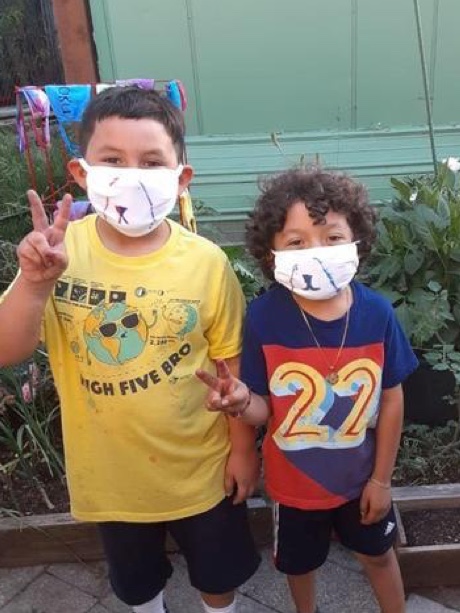Out-of-School Time program staff are partnering with parents in new ways during this pandemic. With in-person programming mostly closed down, kids are connecting with youth programs virtually from their living rooms and kitchens. And staff are getting creative.
For Rebecca Brito, Recreation Leader at Northgate Elementary with Seattle Parks and Recreation (SPR)—a Best Starts for Kids Collaborative with STEMPaths Innovation Network (SPIN)—this parent partnership has been the secret sauce for supporting her students. By tapping into the existing leadership of two mothers in the community, Feben Ghirmatzion and Blanca Melgarejo, nearly 40 kids have stayed engaged in programming despite not being able to attend in person. “I’ve tried to hire them so many times!” she says, laughing.
The current program design happened organically, building on strong relationships. “Feben reached out to me in March to say ‘How are you doing? Hanging in there? Thinking of you!’ and I just knew. These women are already such strong leaders, they’re active in the PTO, they engage other parents, so it went from just asking if I could leave a box of donations on their porch to being something much bigger.” Rebecca remembers the early days of the COVID crisis and trying to plan next steps amidst so much uncertainty. She says that SPIN Deputy Director Kat Barr, “really stepped in while I was just starting to put some pieces together and asked ‘so what are we gonna do for our kids?’”


While SPR was fleshing out their new virtual programming, SPIN started providing 3-D printing classes virtually—and wound up delivering almost double the amount of sessions that were originally designed. “The Best Starts for Kids grant is what guaranteed that we could run direct service. We have a unique opportunity here.” Other possibilities opened up too because of the partnership at Northgate. Weeks before Seattle Public Schools was able to secure laptop donations from Amazon, SPIN was loaning their program equipment to families. “These devices help the kids get access to SPIN and to their education, but it also means parents have access to laptops in their homes, too, for things like filling out unemployment applications.”
Supporting whole families is not an afterthought, but rather a central component to how the partners at Northgate see their role. Blanca and Feben have served as resources hubs in their neighborhoods. They live near the two largest bus stops for the school and are deeply embedded in their respective Latinx and Eritrean communities. These women manage the distribution of supplies, host what are essentially satellite youth programs, coordinate with neighborhood parents, help set up internet and devices, and continue to act as liaisons with the schools for other families. “As hard as we were hustling, these moms were hustling harder. They’re truly beacons of their communities.” says Rebecca.
“As hard as we were hustling, these moms were hustling harder. They’re truly beacons of their communities.”
Rebecca Brito, Recreation Leader at Northgate Elementary with Seattle Parks and Recreation (SPR)
While making regular deliveries of program supplies or books or donated shoes, Rebecca has spent time (with physical distance, of course) hanging out on the porch with these moms, eating pupusas, and talking shop. “They know it’s my job to be able to serve them, but it’s really the community that makes things happen.” This spring’s structure amounted to an experiment of how to engage families amidst a pandemic—a structure that will be continued for summer, which will see an expansion of programs to serve additional youth.
“I’m glad we’re able to empower these moms to serve in the ways they want, because it’s the reason the Northgate neighborhood is so resilient.” Rebecca reflects on the unpaid labor of translation, of outreach and engagement, of serving as cultural ambassadors. She’s seen parents come into the elementary school as volunteers and rise through the ranks to hold formal positions, which is what she believes will change education. “White Eurocentic systems don’t value community work. These parents didn’t see themselves in the education system, and yet they have been able to grow positive relationships and make our school community feel safe. If I didn’t have these parent partnerships, this wouldn’t have worked.”
